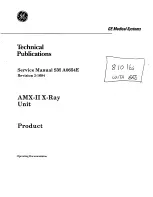
EN
AB2300DEENFRIT
Rev. 07
25/66
4
Notes on safety
No claim of warranty will be considered by the manufacturer unless ALL instructions in this manual
have been followed.
The centrifuge should be installed on a good, stable base.
Before using the centrifuge absolutely check the rotor for firm placement.
When the centrifuge is running, according to EN / IEC 61010-2-020, no persons, dangerous
substances or objects may be within the safety margin of 300 mm around the centrifuge.
Rotors, suspensions and accessories that possess traces of corrosion or mechanical damage or
if their term of use has expired may not be used any longer.
The centrifuge may no longer be put into operation when the centrifuging chamber has safety-
related damages.
For centrifuges without temperature control, when the room temperature is increased and/or if the
device is frequently used, the centrifuging chamber could be heated up. Therefore, it can't be
ruled out that the sample material might be changed due to the temperature.
Before the initial operation of your centrifuge you should read and pay attention to the operating
instructions. Only personnel that has read and understood the operating instructions are allowed to
operate the device.
Along with the operating instructions and the legal regulations on accident prevention, you should also follow the
recognised professional regulations for working in a safe and professional manner. These operating instructions
should be read in conjunction with any other instructions concerning accident prevention and environmental
protection based on the national regulations of the country where the device is to be used.
This centrifuge is a state-of-the-art piece of equipment which is extremely safe to operate. However, it can lead to
danger for users or others if used by untrained staff, in an inappropriate way or for a purpose other than that it
was designed for.
The centrifuge must not be moved or knocked during operation.
In case of fault or emergency release, never touch the rotor before it has stopped turning.
To avoid damage due to condensate, when changing from a cold to a warm room the centrifuge must either heat
up for at least 3 hours in the warm room before being connected to the mains, or run hot for 30 minutes in the
cold room.
Only the rotor approved by the manufacturer for this device and the approved accessories may be used (see
chapter "Anhang/Appendix, Rotoren und Zubehör/Rotors and accessories"). Before centrifuge vessels are used
which are not listed in the chapter "Appendix, Rotors and accessories", the user must make sure they can be
used by asking the manufacturer.
The centrifuge rotor may only be loaded in accordance with the chapter "Loading the rotor".
When centrifuging with maxim revolutions per minute the density of the materials or the material mixtures may not
exceed 1.2 kg/dm
3
.
The centrifuge may only be operated when the balance is within the bounds of acceptability.
The centrifuge may not be operated in explosion-endangered areas.
The centrifuge must not be used with:
inflammable or explosive materials
materials that react with one another producing a lot of energy.
If users have to centrifuge hazardous materials or compounds contaminated with toxic, radioactive or pathogenic
micro-organisms, they must take appropriate measures.
For hazardous substances centrifuge containers with special screw caps must strictly be used. In addition to the
screw cap centrifuge containers, for materials in hazard category 3 and 4 a biosafety system must be used (see
the World Health Organisation’s “Laboratory Biosafety Manual”).
No biosafety systems are available for this centrifuge.
The centrifuge must not be operated with highly corrosive substances which could impair the mechanical integrity
of rotors, hangers and accessories.















































